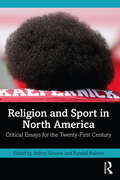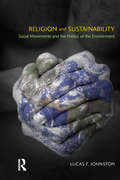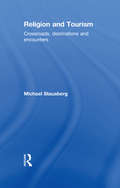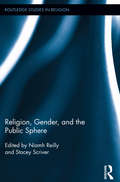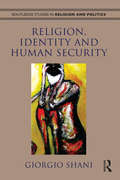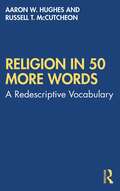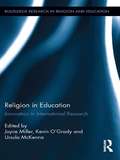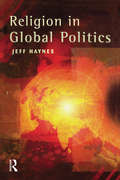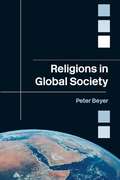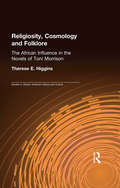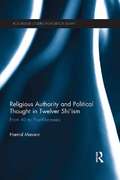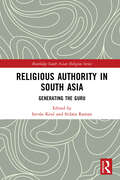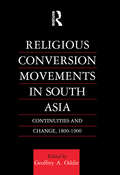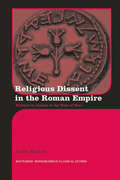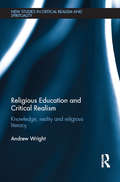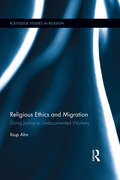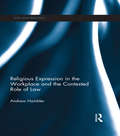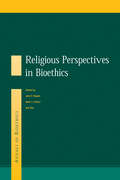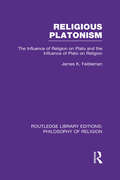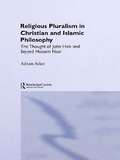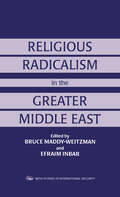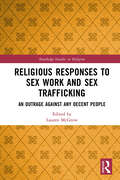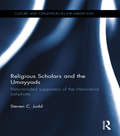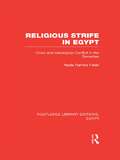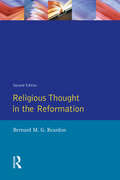Special Collections
Benetech’s Global Certified Accessible Titles
Description: Benetech’s GCA program is the first independent third-party EPUB certification to verify ebook accessibility. By creating content that is born accessible, publishers can meet the needs of all readers. Learn more: https://bornaccessible.benetech.org/
- Table View
- List View
Religion and Sport in North America
by Randall Balmer and Jeffrey ScholesFrom athletes praising God to pastors using sport metaphors in the pulpit, the association between sport and religion in North America is often considered incidental. Yet religion and sport have been tightly intertwined for millennia and continue to inform, shape, and critique one another. Moreover, sport, rather than being a solely secular activity, is one of the most important sites for debates over gender, race, capitalism, the media, and civil religion. Traditionally, scholarly writings on religion and sport have focused on the question of whether sport is a religion, using historical, philosophical, theological, and sociological insights to argue this matter. While these efforts sought to answer an important question, contemporary issues related to sports were neglected, such as globalization, commercialization, feminism, masculinity, critical race theory, and the ethics of doping. This volume contains lively, up-to-date essays from leading figures in the field to fill this scholarly gap. It treats religion as an indispensable prism through which to view sports, and vice versa. This book is ideal for students approaching the topic of religion and sport. It will also be of interest to scholars studying sociology of religion, sociology of sport, religion and race, religion and gender, religion and politics, and sport in general.
Religion and Sustainability
by Lucas F. JohnstonSustainability is now key to international and national policy, manufacture and consumption. It is also central to many individuals who try to lead environmentally ethical lives. Historically, religion has been a significant part of many visions of sustainability. Pragmatically, the inclusion of religious values in conservation and development efforts has facilitated relationships between people with different value structures. Despite this, little attention has been paid to the interdependence of sustainability and religion, and no significant comparisons of religious and secular sustainability advocacy. Religion and Sustainability presents the first broad analysis of the spiritual dimensions of sustainability-oriented social movements. Exploring the similarities and differences between the conceptions of sustainability held by religious, interfaith and secular organizations, the book analyses how religious practice and discourse have impacted on political ideology and process.
Religion and Tourism
by Michael StausbergThis book explores the dynamic interaction between religion and tourism in the modern world. It considers questions such as: do travellers leave their religion at home when they are touring – and what happens if not? what are the relationships between tourism and pilgrimage? what happens to religious performances, places and festivals that function as tourism attractions? Other chapters examine religious theme parks, wellness and spa tourism, the roles played by tourist guides, guidebooks and religious souvenirs, and the role of tourism as a major arena of religious encounters in the contemporary world. Surveying the growing body of work in the field, Michael Stausberg argues that tourism should be a major focus of research within religious studies.
Religion, Gender, and the Public Sphere
by Niamh Reilly and Stacey ScriverThe re-emergence of religion as a significant cultural, social and political, force is not gender neutral. Tensions between claims for women’s equality and the rights of sexual minorities on one side and the claims of religions on the other side are well-documented across all major religions and regions. It is also well recognized in feminist scholarship that gender identities and ethno-religious identities work together in complex ways that are often exploited by dominant groups. Hence, a more comprehensive understanding of the changing role and influence of religion in the public sphere more widely requires complex, multidisciplinary and comparative gender analyses. Most recent discussion on these matters, however, especially in Europe, has focused primarily on the perceived subordinate status of Muslim women. These debates are a reminder of the deep interrelation of questions of gender, identity, human rights and religious freedom more generally. The relatively narrow (albeit important) purview of such discussions so far, however, underscores the need to extend the horizon of enquiry vis-à-vis religion, gender and the public sphere beyond the binary of ‘Islam versus the West’. Religion, Gender and the Public Sphere moves gender from the periphery to the centre of contemporary debates about the role of religion in public and political life. It offers a timely, multidisciplinary collection of gender-focused essays that address an array of challenges arising from the changing role and influence of religious organisations, identities, actors and values in the public sphere in contemporary multicultural and democratic societies.
Religion, Identity and Human Security
by Giorgio ShaniReligion, Identity and Human Security seeks to demonstrate that a major source of human insecurity comes from the failure of states around the world to recognize the increasing cultural diversity of their populations which has resulted from globalization. Shani begins by setting out the theoretical foundations, dealing with the transformative effects of globalization on identity, violence and security. The second part of the volume then draws on different cases of sites of human insecurity around the globe to develop these ideas, examining themes such as: securitization of religious symbols retreat from multiculturalism rise of exclusivist ethno-religious identities post- 9/11 state religion, colonization and the ‘racialization’ of migration Highlighting that religion can be a source of both human security and insecurity in a globalizing world, Shani offers a ‘critical’ human security paradigm that seeks to de-secularize the individual by recognizing the culturally contested and embedded nature of human identities. The work argues that religion serves an important role in re-embedding individuals deracinated from their communities by neo-liberal globalization and will be of interest to students of International Relations, Security Studies and Religion and Politics.
Religion in 50 More Words
by Aaron W. Hughes and Russell T. McCutcheonReligion in 50 More Words: A Redescriptive Vocabulary provides a succinct historical, social, and political examination of some of the key words used in the modern study of religion. Differing from the first volume’s more theoretical focus, this volume analyzes more common first order descriptive terms that are used throughout the field, inviting readers to theorize their traditional vocabulary. Topics covered include: • Atheism/Theism • Conversion • Cult • Evil • Fundamentalism • Idol • Magic • Pilgrimage • Ritual • Sacrifice Religion in 50 More Words submits such terms to a critical interrogation and subsequent redescription. This paves the way for a collective and more critical reframing of the field. The volume, along with Religion in 50 Words, provides an indispensable resource for students and academics working in the field of religious studies and cognate disciplines.
Religion in Education
by Joyce Miller and Kevin O’Grady and Ursula McKennaThis volume explores numerous themes (including the influence of ethnography on religious education research and pedagogy, the interpretive approach to religious education, the relationship between research and classroom practice in religious education), providing a critique of contemporary religious education and exploring the implications of this critique for initial and continuing teacher education.
Religion in Global Politics
by Jeff HaynesOne of the most resilient ideas about societal development after World War II was that nations would inevitably secularise as they modernised. However, as we come to the end of the 'secular' twentieth century, it is obvious that religion continues to be an important factor in politics around the world. The author examines the continuing importance of religion, focusing upon the regions of Europe, the Americas, Africa, and Asia.
Religions in Global Society
by Peter BeyerPeter Beyer, a distinguished sociologist of religion, presents a way of understanding religion in a contemporary global society - by analyzing it as a dimension of the historical process of globalization. Introducing theories of globalization and showing how they can be applied to world religions, Beyer reveals the nature of the contested category of ‘religion’: what it means, what it includes and what it implies in the world today. Written with exceptional clarity and illustrated with lively and diverse examples ranging from Islam and Hinduism to African traditional religions and new age spirituality, this is a fascinating overview of how religion has developed in a globalized society. It is recommended reading for students taking courses on sociology of religion, religion and globalization, and religion and modernity.
Religiosity, Cosmology and Folklore
by Therese E. HigginsFirst published in 2003. Routledge is an imprint of Taylor & Francis, an informa company.
Religious Authority and Political Thought in Twelver Shi'ism
by Hamid MavaniRanging from the time of the infallible Imams, to the contemporary era, this book provides a comprehensive overview of Shi’i religious and political authority, focusing on Iran and Lebanon, without limiting the discourse to Khomeini’s version of an Islamic State. Utilising untapped Arabic and Persian sources, Hamid Mavani provides a detailed, nuanced, and diverse theoretical discussion on the doctrine of leadership (Imamate) in Shi’ism from traditional, theological, philosophical, and mystical perspectives. This theoretical discussion becomes the foundation for an analysis of the transmission of the Twelfth Imam’s religious and political authority vis-á-vis the jurists during his Greater Occultation. Bringing the often overlooked diversity within the Shi’i tradition into sharp focus, Religious Authority and Political Thought in Twelver Shi’ism discusses what constitutes an Islamic state, if there is such a notion as an Islamic state. Hamid Mavani further explores the possibility of creating a space for secularity, facilitating a separation between religion and state, and ensuring equal rights for all. This book argues that such a development is only possible if there is a rehabilitation of ijtihad. If this were to materialise modern religious, social, economic, political, and cultural challenges could be addressed more successfully. This book will be of use to scholars and students with interests ranging from Politics, to Religion, to Middle East Studies.
Religious Authority in South Asia
by István Keul and Srilata RamanThis book focuses on genealogies of religious authority in South Asia, examining the figure of the guru in narrative texts, polemical tracts, hagiographies, histories, in contemporary devotional communities, New Age spiritual movements and global guru organizations. Experts in the field present reflections on historically specific contexts in which a guru comes into being, becomes part of a community, is venerated, challenged or repudiated, generates a new canon, remains unique with no clear succession or establishes a succession in which charisma is routinized. The guru emerges and is sustained and routinized from the nexus of guruship, narratives, performances and community. The contributors to the book examine this nexus at specific historical moments with all their elements of change and contingency. The book will be of interest to scholars in the field of South Asian studies, the study of religions and cultural studies.
Religious Conversion Movements in South Asia
by Geoffrey OddieThis text examines examples of religious conversion throughout South Asia including: Processes of Conversion of Christianity in 19th Century NW IndiaIslamic Conversion in South IndiaKartabhaja Converts to Evangelical Christianity in BengalCentral Kerala Dalit ConversionFrench Mission and Mass MovementsConversion and Non-Conversion Experiences; and more. This book is a significant addition to the growing tradition of scholarship on religious conversion and a valuable resource for scholars and students who are interested in religious, social, and cultural developments of South Asia.
Religious Dissent in the Roman Empire
by Vasily RudichReligious Dissent in the Roman Empire is the third installment in Vasily Rudich’s trilogy on the psychology of discontent in the Roman Empire at the time of Nero. Unlike his earlier books, it deals not with political dissidence, but with religious dissent, especially in its violent form. Against the broad background of Second Temple Judaism and Judaea’s history under Rome’s rule, Rudich discusses various manifestations of religious dissent as distinct from the mainstream beliefs and directed against both the foreign occupier and the priestly establishment. This book offers the methodological framework for the analysis of the religious dissent mindset, which it considers a recurrent historical phenomenon that may play a major role in different periods and cultures. In this respect, its findings are also relevant to the rise of religious violence in the world today and provide further insights into its persistent motives and paradigms. Religious Dissent in the Roman Empire is an important study for people interested in Roman and Jewish history, religious psychology and religious extremism, cultural interaction and the roots of violence.
Religious Education and Critical Realism
by Andrew WrightReligious Education and Critical Realism: Knowledge, Reality and Religious Literacy seeks to bring the enterprise of religious education in schools, colleges and universities into conversation with the philosophy of Critical Realism. This book addresses the problem, not of the substance of our primal beliefs about the ultimate nature of reality and our place in the ultimate order-of-things, but of the process through which we might attend to questions of substance in more attentive, reasonable, responsible and intelligent ways. This book unpacks the impact of modern and post-modern thought on key topics whilst also generating a new critically realistic vision. Offering an account of the relationship between Religious Education and Critical Realism, this book is essential reading for students, scholars and practitioners interested in philosophy, theology and education.
Religious Ethics and Migration
by Ilsup AhnWhat does it mean to provide justice for undocumented workers who have been living among us without proper legal documentation? How can we do justice to the undocumented migrants who have been doing the low-skilled, low-paid jobs unwanted by citizens? Why should we even try to do justice for people who violate the laws of the society? Religious Ethics and Migration: Doing Justice to Undocumented Workers addresses these questions from a distinctive religious ethical perspective: the Christian theology of forgiveness and radical hospitality. In answering these questions, the author employs in-depth interdisciplinary dialogues with other relevant disciplines such as immigration history, global economics, political science, legal philosophy, and social theory. He argues that the political appropriation of a Christian theology of forgiveness and the radical hospitality modeled after it are the most practical and justifiable solutions to the current immigration crisis in North America. Critical and interdisciplinary in its approach, this book offers a unique, comprehensive, and balanced perspective regarding the urgent immigration crisis.
Religious Expression in the Workplace and the Contested Role of Law
by Andrew HamblerThe workplace is a key forum in which the issue of religion and its position in the public sphere is under debate. Desires to observe and express religious beliefs in the workplace can introduce conflict between employees and employers. This book addresses the role the law plays in the resolution of these potential conflicts. The book considers the definition and underlying motives of religious expression, and explores the different ways it may impact the workplace. Andrew Hambler identifies principled responses to workplace religious expression within a liberal state and compares this to the law applying in England and Wales and its interpretation by courts and tribunals. The book determines the extent to which freedom of religious expression for the individual enjoys legal protection in the workplace in England and Wales, and asks whether there is a case for changing the law to strengthen that protection. The book will be of great use and interest to scholars and students of religion and the law, employment law, and religion and human rights.
Religious Perspectives on Bioethics
by Mark CherryFirst published in 2004. Routledge is an imprint of Taylor & Francis, an informa company.
Religious Platonism
by James Kern FeiblemanIn Plato’s Laws is the earliest surviving fully developed cosmological argument. His influence on the philosophy of religion is wide ranging and this book examines both that and the influence of religion on Plato. Central to Plato’s thought is the theory of forms, which holds that there exists a realm of forms, perfect ideals of which things in this world are but imperfect copies. In this book, originally published in 1959, Feibleman finds two diverse strands in Plato’s philosophy: an idealism centered upon the Forms denying full ontological status to the realm of becoming, and a moderate realism granting actuality equal reality with Forms. For each strand Plato developed a conception of religion: a supernatural one derived from Orphism, and a naturalistic religion revering the traditional Olympian deities.
Religious Pluralism in Christian and Islamic Philosophy
by Adnan AslanThe philosophy of religion and theology are related to the culture in which they have developed. These disciplines provide a source of values and vision to the cultures of which they are part, while at the same time they are delimited and defined by their cultures.This book compares the ideas of two contemporary philosophers, John Hick and Seyyed Hossein Nasr, on the issues of religion, religions, the concept of the ultimate reality, and the notion of sacred knowledge.On a broader level, it compares two world-views: the one formed by Western Christian culture, which is religious in intention but secular in essence; the other Islamic, formed through the assimilation of traditional wisdom, which is turned against the norms of secular culture and is thus religious both in intention and essence.
Religious Radicalism in the Greater Middle East
by Bruce Maddy-Weitzman and Efraim InbarThis collection offers a political analysis of religious radicalism in the Greater Middle East - comprising the Middle East, Central Asia and North Africa. The contributors present various conceptual perspectives including international relations, Middle East studies and political sociology.
Religious Responses to Sex Work and Sex Trafficking
by Lauren McGrowThis book examines the history, theological beliefs and current contextual practices of faith-based NGOs who work in the area of human trafficking that involves the sex industry. There are hundreds of religious organizations around the globe who minister with human trafficking survivors and sex workers, but what is really happening on the ground and how do theological beliefs support a faith-based response? Many of these groups represent their work as a cosmic battle against evil forces, yet important structural critiques are ignored in the urgency to rescue women and children. Using perspectives from both NGO staff and sex workers, an interdisciplinary panel of contributors examine specific organizations, highlight marginalized voices, and analyze undergirding methodologies. In doing so, the authors provide clear critiques and establish best practice guidelines for faith-based NGOs and future religious leaders, affirming an intersection of justice based upon critical reflection and careful action. This book addresses with nuance an important topic that is often over-simplified. It will, therefore, be of great interest to scholars studying the interaction of religion to sex work and human trafficking, as well as academics of religious studies and theology more generally.
Religious Scholars and the Umayyads
by Steven JuddReligious Scholars and the Umayyads analyzes legal and theological developments during the Marwānid period (64/684--132/750), focusing on religious scholars who supported the Umayyads. Their scholarly network extended across several generations and significantly influenced the development of the Islamic faith. Umayyad qādòīs, who represented the intersection of religious authority and imperial power, were particularly important. This book challenges the long-standing paradigm that the emerging Muslim faith was shaped by religious dissenters who were hostile to the Umayyads. A prosopographical analysis of Umayyad-era scholars demonstrates that piety and opposition were not necessarily synonymous. Reputable scholars served as qādòīs, tutors and advisors to Umayyad caliphs and governors. Their religious credentials were untarnished by their association with the Umayyads and they appear prominently in later hòadīth collections and fiqh works. This historiographical study demonstrates that excessive reliance on al-Tòabarī’s chronicle has distorted the image of the Umayyads. Alternatively, biographical sources produced by later hòadīth scholars reveal a rich tradition of Umayyad-era religious scholarship that undermines al-Tòabarī’s assumptions. Offering a better understanding of early Islamic religious development, this book is a valuable resource for students and researchers in the fields of Islamic history, Islamic legal studies and Arabic historiography.
Religious Strife in Egypt
by Nadia Ramsis FarahThis critical analysis investigates the causes that brought about one of the most tumultuous periods in modern Egyptian history – the clashes between the Muslims and Copts during the 1970s. A unique retrospective, it features probing interviews with Egyptian intellectuals, writers, political and religious leaders, as well as common citizens from both the Muslim and Copt communities. Within a framework of economic, political and ideological factors, Nadia Ramsis Farah is able to synthesize a compelling portrait of a troubled national conscience in the face of religious strife. First published 1986.
Religious Thought in the Reformation
by Bernard M. ReardonMost general accounts of the reformation concentrate on its events and personalities while recent scholarship has been largely devoted to its social and economic consequences. Benard Reardon's famous book has been designed specifically to reassert the role of religion in the study of reformation history and make the theological issues and arguments that fuelled it accessible to non-specialists today.
